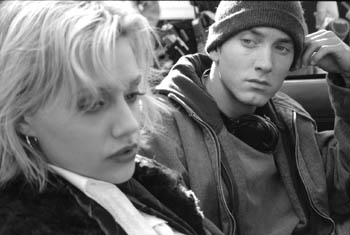![[Metroactive Music]](/music/gifs/music468.gif)
[ Music Index | Silicon Valley | Metroactive Home | Archives ]

Eminem goes from rap to riches in '8 Mile.' Detroit Rap City '8 Mile' is more about class consciousness than dirty lyrics By Gina Arnold UNTIL Harry Potter and the Chamber of Secrets knocked it down one notch, 8 Mile was the No. 1 movie in the country. Sure, its star, Eminem, has sold millions of records, but that's not enough to ensure a rock-based film's success: Almost Famous, Still Crazy, Glitter, Velvet Goldmine and Rock Star all bombed, while the genre's finest moment, This Is Spinal Tap, was considered a commercial failure at the time of its release. The behind-the-scenes story of any rock band is too trite and boring for even the most dedicated fan to stomach. But 8 Mile is different from your usual rock movie; it's more about rap music--the background and context--than about Eminem's rise to fame as a rap star. Perhaps because its aim is so much broader, 8 Mile really works in a way no other rock movie has to date. The film is also semibiographical, and traditionally, biographical movies do better than ones about fictional bands, for the simple reason that the real music--or real stars--is always better than the songs written specifically for a fake group in a fictional movie. Eminem isn't a great actor, and the plot is fairly feeble, but many other things in 8 Mile are not only true to life but also emblematic of our times. Em's horrible home life--the antithesis of family values--and the gritty, rundown mise-en-scène of suburban Detroit are rivetingly rendered. This isn't a feel-good fantasy movie about a boy from the wrong side of the tracks, despite its happy ending. Simply put, never has America looked more like a Third World country. 8 Mile also says a lot about rap's increasing authenticity in the white world. Fifteen years ago, white rappers like the Beastie Boys, though respected, were definitely voyeurs whose embrace of the culture was at best opportunistic. Eminem is allowed a measure of authenticity that was unthinkable back then, purely because the Midwestern (white) world he comes from is just as poor and as violent as that of a kid from the Queensbridge projects in New York. It's yet another sign of the times. Of course, the 10 or so million fans of Eminem aren't all residents of tenements or trailer trash. He has his fans of every color and income bracket. But Eminem's authenticity is his most appealing feature; it's the thing that separates him from most everyone on the pop market today. More and more white rock--be it heavy metal or boy pop or angsty college mope rock--is catering to the world of well-heeled professional classes. Rap, of course, is written by and for the "no-collar" demographic, a group that seems to be growing by leaps and bounds. In addition to its beautifully rendered depiction of the busted-up parking lots, storefronts and hallways of Detroit at night, my favorite aspect of 8 Mile is its clear depiction of rock music--and music fandom--as a class identifier. One of the most telling scenes depicts Eminem and a black friend making up new words to the song "Sweet Home Alabama," which is being enjoyed by Greg, the creepy redneck boyfriend of Eminem's mom. In a few short minutes, the director has opened up a giant chasm of values between Eminem and Greg that no dialogue could do better. Some might say that 8 Mile whitewashes Eminem, who is known for using incredibly violent imagery against women and gays. 8 Mile has a few unfortunately polemic moments--such as when Eminem defends a gay worker at his plant--but in general, it does a great job of showing Eminem's detractors exactly how and why his rhymes sound like they do--how his use of the words "faggot" and "bitch" and "HIV" as derogatory terms are simply endemic (for better or worse) to his community. As for his misogyny, 8 Mile unblinkingly depicts a world where women don't really expect or even deserve respect. The portrait is ugly, but ideally, it should force us to ask the correct question about Em's music, which isn't "Why does he sing such dirty, angry lyrics" but "Why are these lyrics so appealing to so many?" Could they be describing something which is ultimately truthful, and if that's the case, is there any way we can change not the effect, but the cause?
Send a letter to the editor about this story to letters@metronews.com. [ Silicon Valley | Metroactive Home | Archives ]
|
From the November 27-December 4, 2002 issue of Metro, Silicon Valley's Weekly Newspaper.
Copyright © Metro Publishing Inc. Metroactive is affiliated with the Boulevards Network.
For more information about the San Jose/Silicon Valley area, visit sanjose.com.